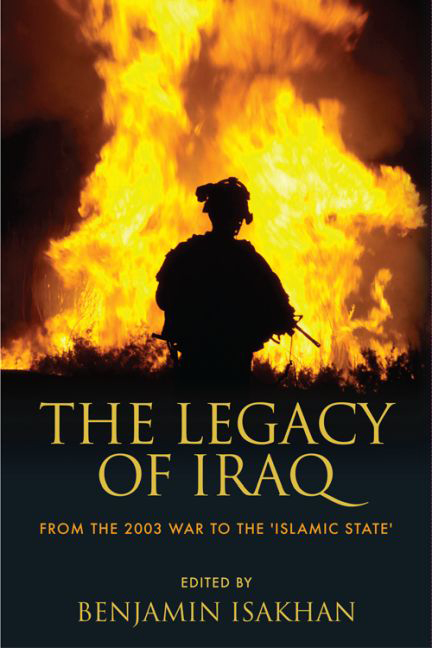Book contents
- Frontmatter
- Contents
- Acknowledgements
- Notes on Contributors
- Introduction: The Iraq Legacies – Intervention, Occupation, Withdrawal and Beyond
- Part I The Aftermath of War: Strategic Decisions and Catastrophic Mistakes
- 1 The De-Baathifi cation of post-2003 Iraq: Purging the Past for Political Power
- 2 The Contested Politics of Iraq's Oil Wealth
- 3 Torture at Abu Ghraib: Non-disclosure and Impunity
- Part II Iraqi Politics since Saddam
- Part III The Plight of Iraqi Culture and Civil Society
- Part IV Regional and International Consequences of the Iraq War
- Conclusion: The Iraq Legacies and the Roots of the ‘Islamic State’
- References
- Index
2 - The Contested Politics of Iraq's Oil Wealth
from Part I - The Aftermath of War: Strategic Decisions and Catastrophic Mistakes
Published online by Cambridge University Press: 25 October 2017
- Frontmatter
- Contents
- Acknowledgements
- Notes on Contributors
- Introduction: The Iraq Legacies – Intervention, Occupation, Withdrawal and Beyond
- Part I The Aftermath of War: Strategic Decisions and Catastrophic Mistakes
- 1 The De-Baathifi cation of post-2003 Iraq: Purging the Past for Political Power
- 2 The Contested Politics of Iraq's Oil Wealth
- 3 Torture at Abu Ghraib: Non-disclosure and Impunity
- Part II Iraqi Politics since Saddam
- Part III The Plight of Iraqi Culture and Civil Society
- Part IV Regional and International Consequences of the Iraq War
- Conclusion: The Iraq Legacies and the Roots of the ‘Islamic State’
- References
- Index
Summary
The Iraq War of 2003 set in motion a series of events that was to have enormous consequences for Iraq's oil sector, its use by political factions and the distribution of its revenue to populations. The US destroyed much of the Iraqi state, turned the country towards ill-defined constitutional federalism, failed to provide a stable security environment, and pushed hard for a liberalisation of the oil sector. Within this broader context, inadequate infrastructure and legal and administrative frameworks for the management of the Iraqi oil sector have meant that recovery in oil production was slow, that much of the revenues did not benefit the population, and that major uncertainties remain over relations between the federal government and regional authorities and over the legality of contracts passed with international oil companies. These legacies will continue to affect the politics and economy of Iraq for decades to come.
On 15 February 2003, millions of people gathered in hundreds of cities around the world to oppose a US- and British-led military invasion of Iraq. Among their main slogans was ‘No more blood for oil’. War, early critics argued, would bring a US-compliant regime and open up to US and British companies Iraq's massive oil wealth: the world's fifth largest oil reserves at 140 billion barrels, and potentially among the most profitable given their relatively low technical production costs (Xu & Bell 2013). Six years after the fall of Baghdad to US troops in April 2003, American and British oil companies were indeed signing major oil exploitation contracts in Iraq for increasing the production of three ‘super-giant’ Iraqi oil fields – Rumaila, West Qurna and Majnoon – while junior oil companies had already taken the opportunity of investing in the Kurdistan region of Iraq at the invitation of a largely autonomous regional government. Concern at a US ‘oil grab’ was also broadly shared within Iraq, where the oil nationalisation of the 1960s remains widely perceived as a proud historical achievement and a guarantee of future sovereignty.
As discussed in this chapter, a foreign take-over of Iraq's oil wealth and the application of neo-liberal policies – premised on the failure of statist policies, the inefficiency and corruption of the public sector, and the need for foreign capital – were at the core of the contested politics of Iraq's oil wealth (Mahdi 2007b; Muttitt 2012).
- Type
- Chapter
- Information
- The Legacy of IraqFrom the 2003 War to the 'Islamic State', pp. 36 - 49Publisher: Edinburgh University PressPrint publication year: 2015



